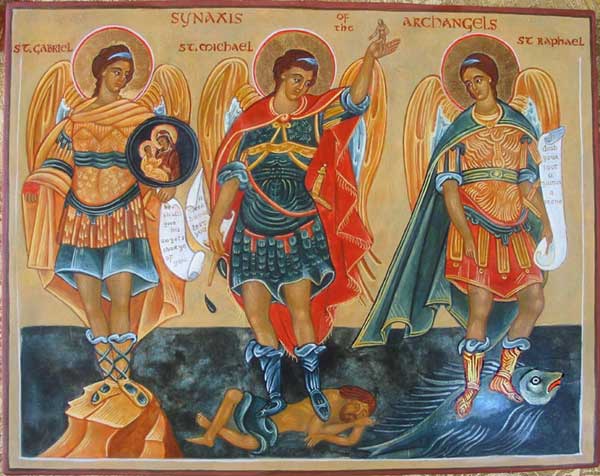Today’s feast day is also known as Michaelmas, traditionally celebrated in Great Britain and elsewhere as the last day of the autumn harvest.

The Book of Revelation (12:7-9) describes a war in heaven in which the Archangel Michael leads an angelic host to defeat Satan. That description accounts for the Church’s confident belief that God protects us each day by the watchful agency of angels, a protection recognized in the Collect for today: “O Everlasting God, who hast ordained and constituted the services of Angels and men in a wonderful order; Mercifully grant that, as thy holy Angels always do thee service in heaven, so, by thy appointment, they may succour and defend us on earth; through Jesus Christ our Lord. Amen.”
Given the turmoil of the past months, it is worth noting that St. Michael is considered by many the patron saint of police officers.
If we were worshiping together today, we would almost certainly sing the very last hymn in our Hymnal, “Ye holy angels bright.” The four stanzas in our Hymnal are from a much longer hymn by Richard Baxter (1615-1691).
Ye holy angels bright,
Who wait at God’s right hand
Or through the realms of light
Fly at your Lord’s command,
Assist our song, or else the theme
Too high doth seem for mortal tongue.
Ye blessèd souls at rest,
Who ran this earthly race,
And now, from sin released,
Behold the Saviour’s face,
His praises sound, as in His sight
With sweet delight ye do abound.
Ye saints, who toil below,
Adore your heavenly King,
And onward as ye go
Some joyful anthem sing;
Take what He gives and praise Him still,
Through good and ill, who ever lives!
My soul, bear thou thy part,
Triumph in God above,
And with a well-tuned heart
Sing thou the songs of love.
Let all thy days till life shall end,
Whate’er He send, be filled with praise
Since we can’t be together to sing it, here is a congregation and choir in Canterbury Cathedral singing it for us. This recording is from a BBC Choral Evensong recorded in August 1983.
Poet Malcolm Guite has written a sonnet for Michaelmas, which you can read (and hear him read) here.
The Offertory for today is a paraphrase of a passage in Revelation 8, the chapter in which the seventh seal is opened:
Stetit angelus juxta aram templi habens thuribulum aureum in manu sua,
An angel stood near the sanctuary of the Temple holding a golden thurible in his hand,
et data sunt ei incensa multa, et ascendit fumus aromatum in conspectu Dei.
and he was given much incense, and aromatic smoke rose in the sight of God.
Here is the setting of this Offertory by Giovanni Pierluigi da Palestrina (1525-1594). It is sung by the Irish chamber choir New Dublin Voices, conducted by Bernie Sherlock.